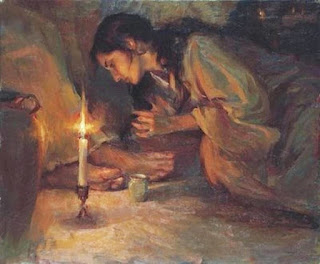Please first read: Luke 7:36-50
Simon, a Pharisee, has invited Jesus to be his guest at his home for dinner and Jesus has accepted. Jesus has previously been invited and accepted various such invitations from publicans, Rabbis and sinners so this s not unusual. Simon’s invite does not necessarily mean he is impressed by Jesus’ teaching … but the size of the crowds involved cannot be ignored.
It would
be appropriate, possibly expected, that a leading Pharisee in the area would so
host such an individual. Because of the strict rules of the Pharisees
as to whom, and how they associate with others of lesser rank and station it
would be deemed and honor for the one invited.
Simon has
been influenced by curiosity and partly by wanting to receive a very popular
and exciting Teacher into his home. As the event unfolds it may be
that Simon expects Jesus to do honor to him. The hospitality is
condescending and limited in its nature. The customary attentions expected
for an invited guest are omitted. Such rudeness is a major violation and
bad reflection on established Eastern virtues.
The guest
should have been invited to refresh himself on arrival. There should have
been a basin of water to wash his feet, (a slave would normally be the one
attending here … a Jewish laborer could not be required to do this) a kiss
of greeting, anointing of his head with oil … the lack of such things was
an affront, a direct insult. Jesus has not been invited as a social or
religious equal. Simon wants to prove and expose Jesus as an impostor, a
fraud.
The meal:
- Homes and yards were open places in this society and a banquet or feast of this time would be somewhat of a public event.
- Visitors and even strangers could come in and observe and engage in the conversations; especially was this done when there were popular figures attending.
- Men were the ones who would usually do this; women were not forbidden, but rarely did so.
- If any poor came they would be given a meal.
- Eating was done while reclining on couches, head toward the table, bare feet facing away to the outside. This was also the style among the Greeks and Romans as well as the Jews.
Simon:
He is a wealthy man and understands Jesus choosing a story about debtors and creditors. The logic cannot be misunderstood.
·
Absent Jesus, this
woman would have not been allowed on the premises. He would not have allowed
the woman to get near or touch him and certainly none of her tears would move
him.
I picture
Simon smiling to himself and thinking, “I gotcha!” (Verse 39)
1.
Expecting Jesus to
condemn the woman … instead he forgives her.
2.
She was a sinner but
through repentance she is now a forgiven sinner.
The Woman:
- She comes specifically seeking Jesus and seems oblivious to everything else around her.
- She is definitely not invited. She has been ostracized from society for the sin of immorality.
- She is weeping and in a repentant and contrite state. Her demeanor and actions indicate a worshipful attitude.
- She is unveiled and her hair is loosed … a breach of public etiquette.
- She kneels at Jesus’ feet and with her tears and hair begins to wash and dry his feet as a slave would do for its master.
- With this accomplished she produces some expensive perfumed ointment (not the less costly oil) and anoints the Lord’s feet. Perfumes were much sought after and many were very expensive. A flask with perfume was worn around the neck by women and used to both sweeten the breath and perfume the person.
- Her sins are great and her love and repentance is great. Both she and Jesus know this, hence Jesus tells her, “Thy sins are forgiven,” and then later “Thy faith hath saved thee.” She has repented of her sins.
Jesus:
Addresses
Simon and exposes him. Jesus not only knows who and what the woman is but
also what thoughts and feelings Simon has in his heart. This is something
that a prophet could be able to do … Simon might begin questioning his resolve
that Jesus is a fraud. The Lord points out Simon’s breach of the required
social graces.
“Seest
thou this woman?” Jesus asks Simon, and obviously he is physically doing
so. The implied answer is Simon does not truly “Seest” the woman as the
Lord does. Do you know her situation? Do you have any idea of her
problems and her disappointments? Why she is as she is? What her life
has been like. Maybe she needs someone to help her. There is not
sufficient here to know if Simon was in any way affected by his time with the
Savior. We do know the woman was for the better.
Glenn R.
McGettigan
March
2016
References:
“Jesus
the Christ.” Talmage
“Life of
Christ.” Farrar
“Our Lord
of the Gospels.” Clark
“The Life
of Christ.” Geike
“Life and
Times of Jesus the Messiah.” Volume 1. Edersheim
“Doctrinal
New Testament Commentary.” Volume 1. McConkie
“Parables
of Jesus the Messiah.” Howick
“The
Complete Biblical Library – Luke.”
“The
Communicators Commentary – Luke.”

